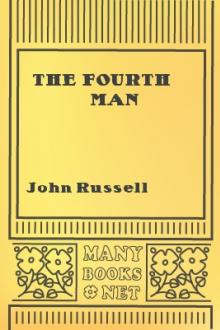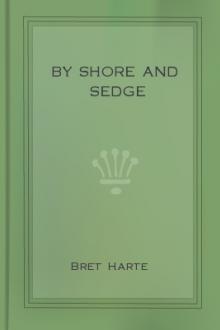The Fourth Man - John Russell (read more books .txt) 📗

- Author: John Russell
- Performer: -
Book online «The Fourth Man - John Russell (read more books .txt) 📗». Author John Russell
The Fourth Man
by John Russell
(1917)
The raft might have been taken for a swath of cut sedge or a drifting tangle of roots as it slid out of the shadowy river mouth at dawn and dipped into the first ground swell. But while the sky brightened and the breeze came fresh off shore it picked a way among shoals and swampy islets with purpose and direction, and when at last the sun leaped up and cleared his bright eye of the morning mist it had passed the wide entrance to the bay and stood to open sea.
It was a curious craft for such a venture, of a type that survives here and there in the obscure corners of the world. The coracle-maker would have scorned it. The first navigating pithecanthrope built nearly as well with his log and bush. A mat of pandanus leaves served for its sail and a pad of niaouli wood for its helm. But it had a single point of real seaworthiness. Its twin floats, paired as a catamaran, were woven of reed bundles and bamboo sticks upon triple rows of bladders. It was light as a bladder itself, elastic, fit to ride any weather. One other quality this raft possessed which recommended it beyond all comfort and all safety to its present crew. It was very nearly invisible. They had only to unstep its mast and lie flat in the cup of its soggy platform and they could not be spied half a mile away.
Four men occupied the raft. Three of them were white. Their bodies had been scored with brambles and blackened with dried blood, and on wrist and ankle they bore the dark and wrinkled stain of the gyves. The hair upon them was long and matted. They wore only the rags of blue canvas uniforms. But they were whites, members of the superior race members, of a highly superior race, according to those philosophers who rate the criminal aberration as a form of genius.
The fourth man was the man who had built the raft and was now sailing it. There was nothing superior about him. His skin was a layer of soot. His prognathous jaw carried out the angle of a low forehead. No line of beauty redeemed his lean limbs and knobby joints. Nature had set upon him her plainest stamp of inferiority, and his only attempts to relieve it were the twist of bark about his middle and the prong of pig ivory through the cartilage of his nose. Altogether a very ordinary specimen of one of the lowest branches of the human family — the Canaques of New Caledonia.
Â
The three whites sat together well forward, and so they had sat in silence for hours. But at sunrise, as if some spell had been raised by the clang of that great copper gong in the east, they stirred and breathed deep of the salt air and looked at one another with hope in their haggard faces, and then back towards the land which was now no more than a grey-green smudge behind them… “Friends,” said the eldest, whose temples were bound with a scrap of crimson scarf, “Friends — the thing is done.”
With a gesture like conjuring he produced from the breast of his tattered blouse three cigarettes, fresh and round, and offered them round.
“Nippers!” cried the one at his right. “True nippers — name of a little good man! And here! Doctor, I always said you were a marvel. See if they be not new from the box!”
Dr. Dubosc smiled. Those who had known him in very different circumstances about the boulevards, the lobbies, the clubs, would have known him again and in spite of all disfigurement by that smile. And here, at the bottom of the earth, it had set him still apart in the prisons, the cobalt mines, the chain-gangs of a community not much given to mirth. Many a crowded lecture-hall at Montpellier had seen him touch some intellectual firework with just such a twinkle behind his bristly grey brows, with just such a thin curl of lip.
“By way of celebration,” he explained. “Consider. There are seventy-five evasions from Noumea every six months, of which not more than one succeeds. I had the figures myself from Dr. Pierre at the infirmary. He is not much of a physician, but a very honest fellow. Could anybody win on that percentage without dissipating? I ask you.”
“Therefore you prepared for this?”
“It is now three weeks since I bribed the night-guard to get these same nippers.”
The other regarded him with admiration. Sentiment came readily upon his beardless face, tender and languid, but overdrawn, with eyes too large and soft and oval too long. It was one of these faces familiar enough to the police which might serve as model for an angel were it not associated with some revolting piece of devilry. Fenayrou himself had been condemned “to perpetuity” as an incorrigible.
“Is not our doctor a wonder?” he inquired as he handed a cigarette along to the third white man. “He thinks of everything. You should be ashamed to grumble. See — we are free, after all. Free!”
The third was a gross, pock-marked man with hairless lids known sometimes as Niniche, Trois Huit, Le Tordeur, but chiefly among companions as Perroquet — a name derived perhaps from his beaked nose, or from some perception of his jail-bird character. He was a garrotter by profession, accustomed to rely upon his fists only for the exchange of amenities. Dubosc might indulge a fancy and Fenayrou seek to carry it as a pose, but The Parrot remained a gentleman of strictly serious turn. There is perhaps a tribute to the practical spirit of penal administration in the fact that while Dubosc was the most dangerous of these three and Fenayrou the most depraved Perroquet was the one with the official reputation, whose escape would be signalled first among the “Wanted.” He accepted the cigarette because he was glad to get it, but he said nothing until Dubosc passed a tin box of matches and the first gulp of picadura filled his lungs…
“Wait till you’ve got your two feet on a pavé, my boy. That will be the time to talk of freedom. What? Suppose there came a storm.”
“It is not the season of storms,” observed Dubosc.
But The Parrot’s word had given them a check. Such spirits as these, to whom the land had been a horror, would be slow to feel the terror of the sea. Back there they had left the festering limbo of a convict colony, oblivion. Out here they had reached the rosy threshold of the big round world again. They were men raised from the dead, charged with all the furious appetites of lost years, with the savour of life strong and sweet on their lips. And yet they paused and looked about in quickened perception, with the clutch at the throat that takes the landsman on big waters. The spaces were so wide and empty. The voices in their ears were so strange and murmurous. There was a threat in each wave that came from the depths, a sinister vibration. None of them knew the sea. None knew its ways, what tricks it might play, what traps it might spread — more deadly than those of the jungle.
The raft was running now before a brisk chop with alternate spring and wallow, while the froth bubbled in over the prow and ran down among them as they sat. “Where is that cursed ship that was to meet us here?” demanded Fenayrou.
“It will meet us right enough.” Dubosc spoke carelessly, though behind the blown wisp of his cigarette he had been searching the outer horizon with keen glance. “This is the day as agreed. We will be picked up from the mouth of the river.”
“You say,” growled Perroquet. “But where is any river now? Or any mouth? Sacred name, this wind will blow us to China if we keep on.”
“We dare not lie in any closer. There is a Government launch at Torrien. Also the traders go armed hereabouts, ready for chaps like us. And don’t imagine that the native trackers have given us up. They are likely to be following still in their proas.”
“So far?”
Fenayrou laughed, for The Parrot’s dread of their savage enemies had a morbid tinge.
“Take care, Perroquet. They will eat you yet.”
“Is it true?” demanded the other, appealing to Dubosc. “I have heard it is even permitted these devils to keep all runaways they can capture — name of God! — to fatten on.”
“An idle tale,” smiled Dubosc. “They prefer the reward. But one hears of convicts being badly mauled. There was a forester who made a break from Baie du Sud and came back lacking an arm. Certainly these people have not lost the habit of cannibalism.”
“Piecemeal,” chuckled Fenayrou. “They will only sample you, Perroquet. Let them make a stew of your brains. You would miss nothing.”
But The Parrot swore.
“Name of a name — what brutes!” he said, and by a gesture recalled the presence of that fourth man who was of their party and yet so completely separated from them that they had almost forgotten him.
The Canaque was steering the raft. He sat crouched at the stern, his body glistening like varnished ebony with spray. He held the steering paddle, immobile as an image, his eyes fixed upon the course ahead. There was no trace of expression on his face, no hint of what he thought or felt or whether he thought or felt anything. He seemed not even aware of their regard, and each one of them experienced somehow that twinge of uneasiness with which the white confronts his brother of colour — this enigma brown or yellow or black he is fated never wholly to understand or to fathom…
“It occurs to me,” said Fenayrou, in a pause, “that our friend here who looks like a shiny boot is able to steer us God knows where. Perhaps to claim the reward.”
“Reassure yourself,” answered Dubosc. “He steers by my order. Besides, it is a simple creature — an infant, truly, incapable of any but the most primitive reasoning.”
“Is he incapable of treachery?”
“Of any that would deceive us. Also, he is bound by his duty. I made a bargain with his chief up the river, and this one is sent to deliver us on board our ship. It is the only interest he has in us.”
“And he will do it?”
“He will do it. Such is the nature of the native.”
“I am glad you feel so,” returned Fenayrou, adjusting himself indolently among the drier reeds and nursing the last of his cigarette. “For my part I wouldn’t trust a figurehead like that for two sous. Mazette! What a monkey face!”
“Brute!” repeated Perroquet, and this man, sprung from some vile riverfront slum of Argenteuil, whose home had been the dock pilings, the grog shop, and the jail, even this man viewed the black Canaque from an immeasurable distance with the look of hatred and contempt…
Under the heat of the day the two younger convicts lapsed presently into dozing. But Dubosc did not doze. His tormented soul peered out behind its mask as he stood to sweep the skyline again under shaded hand. His theory had been so precise, the fact





Comments (0)